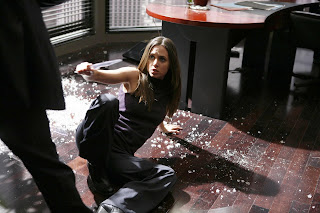 Dollhouse – A Spy in the House of Love
Dollhouse – A Spy in the House of Love
Another good, verging on very good, episode. It was one of the more exciting ones in terms of plot. The small mystery of the story was tense and interesting, and the hints dropped for the larger arc of the show were also tantalizing. Still, it was missing the certain je nais sais quoi that made Man on the Street the only episode that has really stood out so far.
Some scattered thoughts:
– I really like seeing Adele outside of the strict confines of her role as boss. I especially like seeing her as subject to the same weaknesses we see in the clients of the Dollhouse. It’s particularly good to recognize that a full (inside) awareness of the “fakeness” of the Dollhouse doesn’t prevent someone from making use of it.
Even more, it invites a serious question about the difference between the handler who was done away with for raping Sierra and Adele who uses Victor for the same purpose without his consent. Obviously it feels a lot different – if only because of what it reveals about the desire of the user. The handler wanted dominant, violent control. He wanted to assert ownership over a thing. Adele, on the other hand, wants an equal, someone with whom she can be herself (or, at least what she perceives as her “real” self), someone who will actually take a dominant role with her.
– Once again, they’ve laid out more and more levels of confusion and intrigue. I do appreciate this, under the assumption that they know where things are going and these aren’t pointless pathways. In order to keep us interested, at some point, they need to start resolving some of these bits and pieces and move onto others. For example, I’m not sure how long we can go without knowing what the dollhouse is actually for, whether “they” (whoever they might be) want Echo to go off program or not, whether there is a mole communicating with Ballard through Echo and Mellie or if it’s just the Dollhouse manipulating him, etc.
– Enver Gjokaj (Victor) is great. There’s been a lot of justified praise in reviews I’ve read for Dichen Lachman (Sierra) and Olivia Williams (Adele), but for my money, Gjokaj has by far been the most impressive. He consistently plays a variety of characters and gives them all a unique style and sense of personality.
– The scene where Mellie returns was very well done. And I think it reveals something deeply troubling about Ballard that he was able to so easily accept it and act like nothing had changed when the Mellie personality came back. I know in a lot of ways he’s the Good Guy (as would be traditionally understood), so I like that we actually see a lot of the ways in which he is seriously disturbed. And I’m curious to see if they keep working that angle. I’d love for Ballard to end up being the villain.
– What exactly do the dolls think when they first come out of the imprinting process? They start getting at this question with Mellie and frankly it doesn’t make sense. She talks about taking the red-eye, and clearly recognize Echo as Caroline to some extent. But obviously “Mellie” – if she remembered ANY of this would desperately want to try and help Ballard. What’s more, there are others (Echo in this episode for example) who come out from the chair and immediately are active and aware of the situation. Are we just supposed to believe that Topher can so perfectly imprint the mind of the actives that none of this stuff matters?
– Speaking of elements of the plot didn’t really make sense, how did the mole know to send out a warning to Ballard immediately before the spy chip was discovered? Presumably, this is meant to suggest that things are more complicated than they initially seem. It seems pretty likely that there is more than one mole, or that the whole notion of a mole is less simple than it appears here. That said, the argument that “things will make sense eventually” is a question of faith. And I’m still not entirely willing to overlook plot holes in the hopes that they will eventually be clarified.
Overall reaction: this show still has plenty of flaws, but after the mishmash and stumbling of the first five weeks, I’m starting to feel a lot more confident that Joss knows what he’s doing.
It feels like a show that is trying to do things – and occasionally succeeding. If it stays at this level of quality, I will definitely keep watching and will be disappointed at the seemingly inevitable cancellation. And if the hints and promises ever materialize for a run of episodes that take things to the next level, it could be a genuinely good show.
